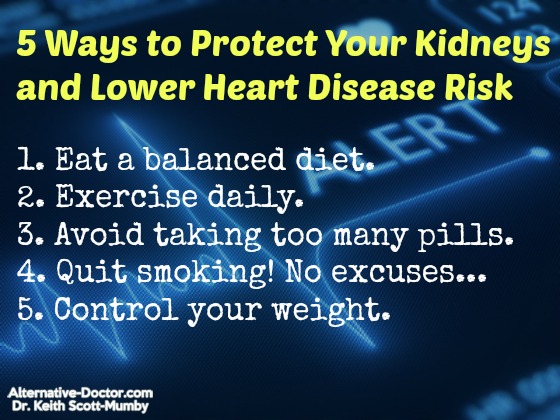You know your kidneys are critical to your health, but do you know all the functions they accomplish around the clock?
Kidneys work hard to…
- Remove waste products from your body through the urine that are by-products of the foods you eat.
- Flush out toxins you accumulate from your environment, lifestyle habits such as smoking or substance abuse, and the chemical by-products of pharmaceutical drugs.
- Produce active vitamin D that keeps your bones strong.
- Affect your uptake of the essential vitamin calcium from the intestinal tract.
- Keep your body’s fluid levels in balance.
- Regulates your production of red blood cells.
- Control blood pressure with the release of hormones.
The link between kidney health and heart health is becoming better understood every year.
A recent study by the Johns Hopkins Bloomberg School of Public Health found that a decrease in kidney function might be a measurable heart disease risk factor – including determining who is at risk of sudden death from heart attack or stroke. Their research findings were published in the Lancet Diabetes and Endocrinology journal.
Known Heart Disease Risk Factors – Not Preventable
• Age: The majority of those who die from heart failure are over the age of 65 and suffer from long-term damage to arteries, weaker heart, and thickening of the heart muscle.
• Family History: If you have an immediate family member who developed heart disease before the age of 55, your risk is higher.
• Gender: Males are at greater risk of heart disease but women are more likely to die of a heart attack than men.
• Congenital Heart Defect (something you are born with)
Known Heart Disease Risk Factors – Preventable
• Poor Diet: If you consume too many unhealthy fats or eat a diet high in refined sugar, flour, or salt. If you do not consume enough fruits and vegetables, healthy fats, and antioxidants, your risk for heart disease rises.
• Smoking: If you smoke, your risk of heart disease is 2-4 times higher than a non-smoker and you are more likely to die of a heart event than a non-smoker.
• Substance Abuse: Excessive alcohol consumption or drug use puts a strain on all of your vital organs.
• Diabetes (the risk factors for heart disease and diabetes are similar)
• Sedentary Lifestyle: You should try to exercise at least 30 minutes every day – even if it is low-impact. This is a risk factor of heart disease and many other serious illnesses.
• Stress: Ongoing stress leads to chronic inflammation, which damages your arteries and can directly cause high blood pressure. HBP that is out of control eventually leads to hardening of the arteries.
• Obesity: This particular risk factor can make other risk factors listed here much worse. For instance, if you are obese and a smoker, your risk is even higher.

Testing kidney function is a common procedure done in the United States for patients with diabetes and heart disease. One test checks for creatinine and determines the estimated glomerular filtration rate (eGFR). The other measures the output of protein (albumin) in the urine. These tests can determine the existence of kidney malfunction or failure.
Lead researcher in the Johns Hopkins’ study, MD, PhD Kunihiro Matsushita, explained, “Cholesterol levels and blood pressure tests are good indicators of cardiovascular risk, but they are not perfect.”
Their data was collected from two dozen prior studies done on more than 637,000 people without prior history of heart disease. Both kidney tests were found to pinpoint a valid risk factor of heart disease.
If you suffer from kidney disease, your risk of heart disease is double that of a person with healthy kidneys. It is critical to keep them in excellent condition at all times!
5 Ways to Protect Your Kidneys and Lower Heart Disease Risk
1. Eat a balanced diet. I talk about this constantly! Get rid of the junk and replace it with organic produce, healthy fats, and high antioxidant content. Limit your intake of many pro-inflammatory goods such as alcohol or caffeine.
2. Exercise daily. Whether you feel like it or not, get moving. Choose a low-impact form to get you in the habit and then keep going.
3. Avoid taking too many pills. If you don’t truly need over-the-counter medication, stop taking it! Talk to your doctor about reducing your number of prescriptions.
4. Quit smoking! No excuses because you know what this does to every cell inside you!
5. Control your weight. This isn’t about feeling bad about your outer image, this is about the health of every organ you have. Obesity puts a strain on you and raises your risk for every primary disease – and it can be changed.
These tips are good to lower your risk of every critical disease and they are based on common sense. Get started on a healthier you right now.
